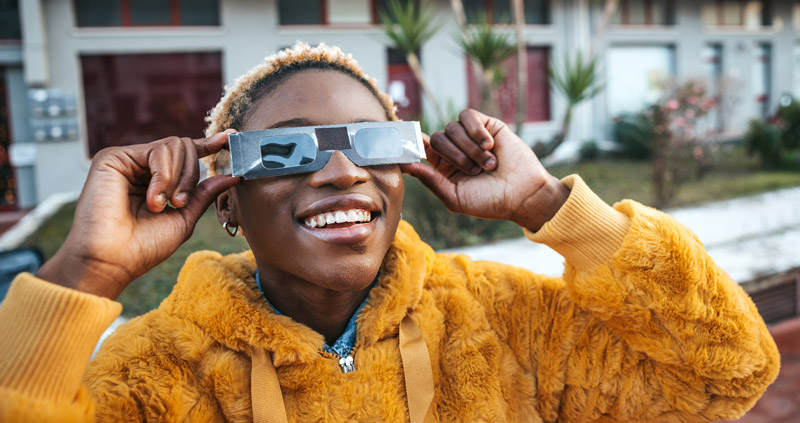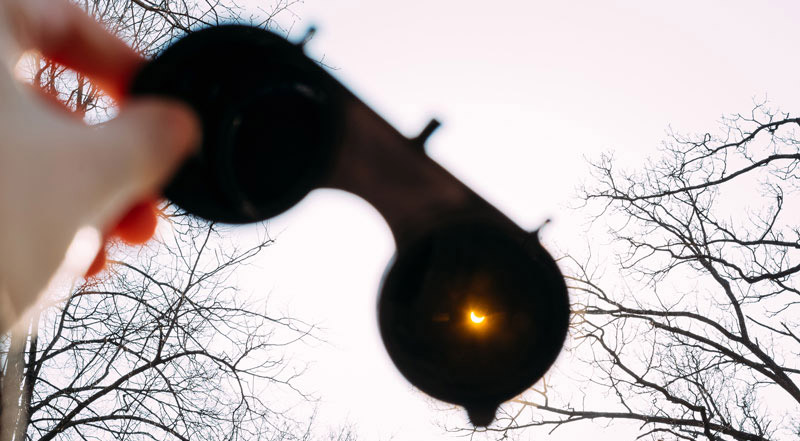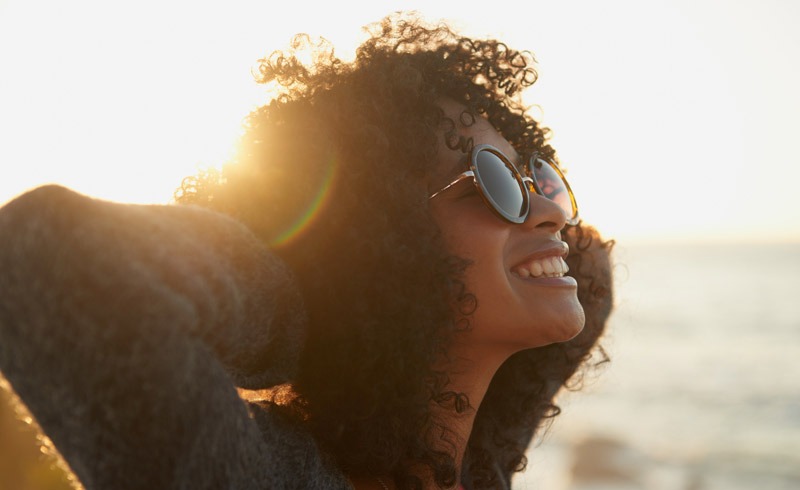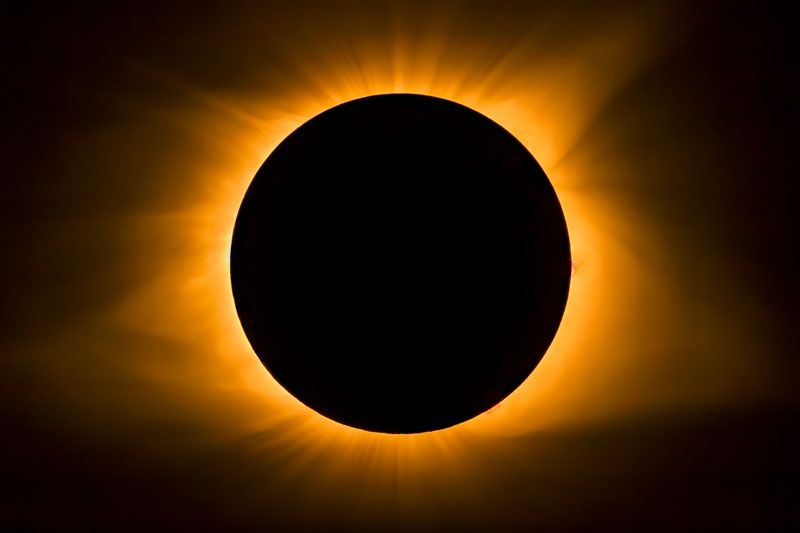Eclipse Glasses and Eclipse Safety
Solar eclipses are stunning cosmic events that require special eye protection to view. Enjoy the spectacle while protecting your eyes with these solar eclipse safety tips!
Tips for Safely Viewing a Solar Eclipse
First things first: Never look directly at the Sun. Looking directly at the Sun can severely damage your eyes and even cause blindness. You should never view the Sun using a camera, telescope, binoculars, or any other lens, unless it is properly equipped with a specialized solar filter. Additionally, do not look through a lensed device while wearing eclipse glasses; the lenses of the device will magnify the Sun’s rays, damaging the eclipse glasses and your eyes!
Indirectly viewing the Sun via a reflection off a window or phone screen is also damaging to your eyes; take precaution by using specialized equipment, such as the eclipse glasses or solar filters described in this blog.

How Do Eclipse Glasses Work?
Eclipse glasses—also known as solar filters or solar glasses—are specially designed glasses that allow people to safely observe the Sun during a solar eclipse. These glasses work by reducing the amount of sunlight that enters the eye, specifically the harmful ultraviolet (UV) and infrared (IR) radiation that can damage the eye's retina and cause blindness.

Eclipse Glasses Lenses
The lenses of eclipse glasses are made from a special type of solar filter material that is designed to block out nearly all of the Sun's harmful rays. This material typically consists of a thin layer of aluminum or silver deposited on a piece of plastic film, which is then coated with a layer of black polymer or dye. This combination of materials absorbs harmful UV and IR radiation and allows only a safe amount of visible light to enter the eye.
When wearing eclipse glasses, users can look directly at the Sun without damaging their eyes. However, it is important to note that not all eclipse glasses are created equal. It is crucial to ensure that the glasses are certified safe for direct solar viewing and have the proper ISO rating. Additionally, the glasses should be inspected for any defects or damage before use, as even a small scratch or tear can compromise their effectiveness and safety.
Skip the hassle of vetting solar eclipse glasses by ordering a pair from PASCO!

Our glasses meet the ISO standards for directly viewing the Sun and are CE certified, so you can feel confident about your safety during the upcoming solar eclipses! Order your solar eclipse glasses below.
| Order Glasses Here |
Can I Wear Sunglasses Instead of Eclipse Glasses?
No, sunglasses are not a substitute for proper eye protection! Solar filters are thousands of times darker than sunglasses.
Looking at the Sun with sunglasses can actually be very dangerous, as they can cause permanent eye damage or even blindness. Sunglasses do not provide enough protection for viewing the Sun, and can actually make your eyes more susceptible to damage because they cause your pupils to dilate, letting in more harmful radiation.

Most sunglasses are designed to protect your eyes from the Sun's harmful ultraviolet (UV) rays, which can cause damage to your eyes over time. UV rays have been linked to the development of cataracts, macular degeneration, and other eye conditions. So, wearing sunglasses with UV protection is a great way to reduce your risk of developing these conditions. However, regular sunglasses do not protect your eyes from other harmful rays that come from the Sun, such as infrared radiation, which can also cause damage to your eyes.
So, while sunglasses do provide some protection, they are not suitable when viewing the Sun directly or working in environments with high levels of UV or infrared radiation. If you are planning to view the Sun, it is important to use solar filters designed specifically for that purpose.
How Do You Know if Your Eclipse Glasses are Legitimate?
When it comes to solar filters, it's important to make sure that you are using legitimate filters that meet safety standards. Here are some tips to help you determine if your solar filters are legitimate:
- Look for a certification label: Legitimate solar filters should have a certification label from an accredited testing organization. This label indicates that the filter has been tested and meets international safety standards.
- Check the manufacturer: Only purchase solar filters from reputable manufacturers who specialize in making solar filters. Be wary of filters from unknown or unverified manufacturers.
- Test the filter: Before using a solar filter, test it to make sure it is safe to use. Hold the filter up to the Sun and make sure that you can't see anything through it except for the Sun. If you can see any other objects or light sources, the filter may not be safe to use.
- Avoid makeshift filters: Do not attempt to make your own solar filter or use unapproved materials such as sunglasses or photographic film. These makeshift filters are not designed to block out enough of the Sun's harmful rays and can cause permanent eye damage.
Is There Ever a Safe Time to Look Directly at a Solar Eclipse?
The only time it is safe to look at a solar eclipse without solar filters is during the moment of totality that occurs during a total solar eclipse. In order to view the Sun safely, viewers should be in the path of totality at the time when the moon completely blocks the Sun. During totality, you can look directly at the completely eclipsed Sun and see the corona glowing around the moon’s silhouette. The corona is the Sun’s dim outer atmosphere, and is similar in brightness to a full moon.

If you are lucky enough to be in the path of totality during a total solar eclipse, research how long the eclipse will last in your location. Generally, a solar eclipse lasts only minutes. You should avert your gaze about 30 seconds before the eclipse is predicted to end to avoid direct sunlight from entering your eye.
Eye protection is important during the partial phases of an eclipse before and after totality, as well as during an annular eclipse when the Sun is never completely obstructed.
Remember, when it comes to viewing the Sun, safety should always come first. Be sure to use legitimate solar filters from reputable sources like PASCO to protect your eyes and enjoy a safe and memorable viewing experience.
Find out where and when you can view the next solar eclipse by visiting our eclipse page!






